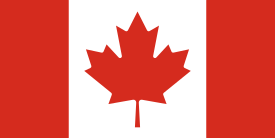
Back قومية كندية Arabic Nacionalismo canadiense Spanish Nationalisme canadien French Nacionalismo canadense Galician

Canadian nationalism promotes the unity, independence, and well-being of Canada and Canadians.[1] Canadian nationalism has been a significant political force since the 19th century and has typically manifested itself as seeking to advance Canada's independence from influence of the United Kingdom and the United States.[1] Since the 1960s, most proponents of Canadian nationalism have advocated a civic nationalism due to Canada's cultural diversity that specifically has sought to equalize citizenship, especially for Québécois and other French-speaking Canadians, who historically faced cultural and economic discrimination and assimilationist pressure from English Canadian-dominated governments.[2] Canadian nationalism became an important issue during the 1988 Canadian federal election that focused on the then-proposed Canada–United States Free Trade Agreement, with Canadian nationalists opposing the agreement – saying that the agreement would lead to inevitable complete assimilation and domination of Canada by the United States.[3] During the 1995 Quebec referendum to determine whether Quebec would become a sovereign state or whether it would remain in Canada, Canadian nationalists and federalists supported the "no" side while Quebec nationalists largely supported the "yes" side, resulting in a razor-thin majority in favour of the "no" side.
Canadian nationalism in English-speaking Canada opts for a certain level of sovereignty for Canada vis-à-vis other sovereign states, while remaining within the Commonwealth of Nations. The Canadian Tories have historically exemplified this formulation of nationalism in their opposition to free trade with the United States, stemming from a fear of economic and cultural assimilation. On the other hand, French Canadian nationalism prioritizes the preservation of the Québécois nation. This French-Canadian nationalism has existed ever since the conquest of New France in the mid-eighteenth century. Although radical French-speaking reformers in the Lower Canada Rebellion of 1837 supported the creation of a new Québécois republic, a more accurate portrait of French-Canadian nationalism is illustrated by such figures as Henri Bourassa during the first half of the twentieth century. Bourassa advocated for a nation less reliant on Great Britain whether politically, economically or militarily. After Bourassa and during the Quiet Revolution, French-Canadian nationalism in Quebec evolved into Quebec nationalism. Quebec nationalists include sovereigntists, who believe Quebec should secede from Canada, and autonomists, who believe Quebec should hold extensive self-governing power within Canada.
- ^ a b Motyl 2001, pp. 68.
- ^ Recent social trends in Canada, 1960–2000. Pp. 415.
- ^ Motyl 2001, pp. 69.